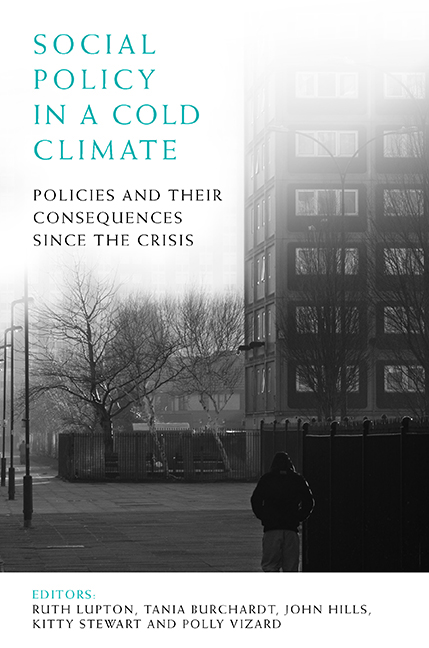Twelve - The changing structure of UK inequality since the crisis
Published online by Cambridge University Press: 01 September 2022
Summary
Introduction
Chapter Eleven looked at overall changes in inequality in the six years following the start of the financial and economic crisis in 2007. For the population as a whole, the striking features were the rapid fall in real wages, associated with growing wage inequality, but a large fall in household income inequality (allowing for benefits and direct taxes) between 2009/10 and 2010/11, followed by three years of stability. These overall patterns do not necessarily apply in the same way to all groups within the population. Indeed, the fact that recent stability in overall measures of income inequality resulted from a combination of growing inequalities in the labour market, offset by increases in the relative values of benefits and pensions, already suggests that some groups will have gained and others will have lost.
This chapter draws on detailed analysis of how the changes in the labour market, incomes and wealth affected particular population groups, and of how inequalities changed within those groups (Hills et al, 2015a). We present here some of the patterns this revealed when dividing the population by gender, age, ethnicity, housing tenure, region and disability status. The figures are for regions across the whole of the UK, with the exception of wealth, which is for Great Britain (excluding Northern Ireland). The analysis uses the baseline of the results originally presented by the National Equality Panel (Hills et al, 2010) which was able to use data from the years around 2007. As in Chapter Eleven, we show the position up to 2013 for labour market outcomes and up to 2010-12 (the two years to June 2012) for wealth. For household incomes (both before and after housing costs) we were able to look at the position up to the financial year 2012/13, a year before the latest year available for the national statistics used in Chapter Eleven. There was little change in overall income inequality between the two years, but that stability may mask further changes between and within groups beyond those we can show here. Note that these statistics do not reflect the effects of the ‘welfare’ and other reforms taking place from or after 2013 discussed in Chapter Two earlier.
- Type
- Chapter
- Information
- Social Policy in a Cold ClimatePolicies and their Consequences since the Crisis, pp. 267 - 290Publisher: Bristol University PressPrint publication year: 2016

